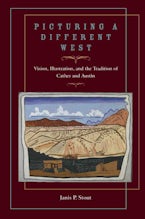Picturing a Different West addresses Willa Cather and Mary Austin as central figures in a women’s tradition of the pictured West. Both Cather and Austin moved west in their youth and spent much of their lives there. Cather lived on the Great Plains, while Austin resided in California and the Southwest. Cather’s travels repeatedly took her to the Southwest, and she wrote three novels with Southwestern settings.
Starting with the masculine tradition of Western art that was prevalent when Austin and Cather launched their careers, Janis P. Stout shows how the authors challenged and revised that tradition. Rather than a West of adventure, violence, and conquest, open only to rugged and daring men, the authors envisioned a new West—not conventionally feminine so much as an androgynous space of freedom for women and men alike. Their vision of an alternative West and their alternative ways of thinking about and portraying gender are inseparable.
Placing Cather and Austin alongside contemporaries Elsie Clews Parsons, Mabel Dodge Luhan, Georgia O’Keeffe, and Laura Gilpin, Stout emphasizes the visual nature of Austin’s and Cather’s personal experiences of the West and Southwest, their awareness of the prevailing visual representations of the West, and the visual nature of their books about the West, with respect to both prose style and illustrations. In closing, Stout demonstrates the continuance of their tradition in illustrated western books by Leslie Marmon Silko and by Margaret Randall and Barbara Byers.

